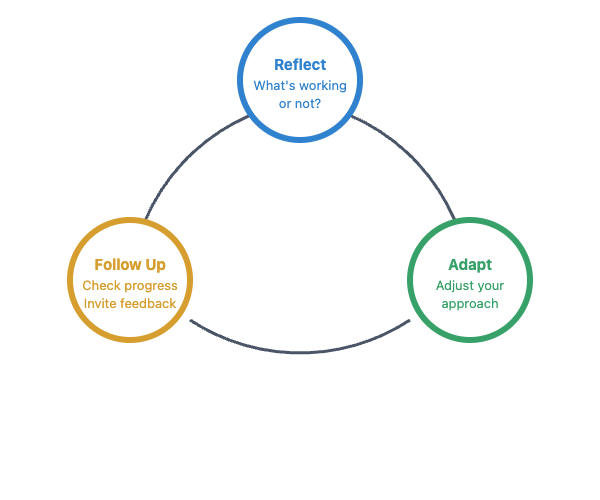Welcoming feedback from your mentee isn’t just a nice-to-have, rather, it’s a core part of being a growth-minded mentor. How you invite, receive, and act on feedback sets the tone for your whole mentoring relationship. Think of yourself as a collaborator, not just a guide: your openness helps your mentee feel safe to share, experiment, and grow alongside you.
Here’s how to make feedback a two-way street:
- Ask for feedback directly and specifically. Instead of waiting for your mentee to speak up, try: “What could I do differently to support your learning?” or “Is there anything about my communication style that could be more helpful for you?”
- Make it easy for your mentee to be honest. Narrow your questions: “I’d love your thoughts on how our last code review went. Was the pace comfortable for you, or would you prefer a different approach?” This shows you’re genuinely interested in their experience.
When your mentee shares feedback, your response matters. Even if it’s informal or small, show appreciation and let them know their voice counts.
Here are some ways to respond:
- “Thanks for sharing that — your input helps me be a better mentor.”
- “I appreciate your suggestion about using more visuals; I’ll incorporate that in our next session.”
- “That’s a great idea. I might not be able to implement it right away, but I’ll keep it in mind for future sessions.”
- “I hear your feedback about the pace. Here’s why we need to keep it this way for now, but let’s revisit this together soon.”
If you can’t make a change right away, let your mentee know you appreciate their input and briefly share the reason for the delay or limitation. Emphasize that you’re open to future suggestions and want to keep the feedback conversation going. This helps your mentee feel heard and encourages ongoing openness, even when adjustments can’t happen right away.
Once your mentee shares feedback, it’s important to adapt your approach. For example, if your mentee says they learn best with diagrams, you can respond by including more visuals in your sessions. This kind of responsiveness not only improves your mentorship, but also encourages your mentee to keep sharing their needs.
Let’s see how this looks in a real dialogue:
- Milo: Hey Natalie, I wanted to check in — do you feel like our weekly syncs are working for you, or is there anything I could do differently to support your learning?
- Natalie: Thanks for asking, Milo. I actually find it a bit hard to follow when we go through code reviews without any visuals. I’m more of a visual learner, so diagrams or flowcharts would help me a lot.
- Milo: That’s really helpful feedback, Natalie. I appreciate you letting me know. I’ll start including diagrams in our next sessions and see if that makes things clearer. If you have any other suggestions, please keep them coming!
- Natalie: Thanks, Milo! I’ll let you know how it goes. I appreciate you being open to trying new things.
Notice how Milo invites specific feedback, listens without defensiveness, and responds with appreciation and a clear plan to adapt. Natalie feels heard and encouraged to keep sharing.
Continuous improvement is at the heart of great mentorship. Regularly reflect on your interactions and notice if your mentee seems hesitant, disengaged, or confused, and use their feedback to adjust. For instance, if you realize your explanations are too technical, you might say: “I noticed our last session got a bit technical. Next time, I’ll break things down with more analogies and check in to make sure it’s clear.”
Try using this simple cycle to guide your growth as a mentor:
- Reflect: Notice what’s working and what isn’t from your own perspective and your mentee’s feedback.
- Adapt: Make changes to your approach based on what you’ve learned.
- Follow Up: Check in with your mentee to see if the changes are helping, and invite more feedback.

After making changes, check in to see if your adjustments are working. This ongoing cycle not only makes you a better mentor, but also models a growth mindset for your mentee.
By inviting feedback, responding with care, and adapting your approach, you create a mentoring relationship where both you and your mentee can thrive. You’ll get to practice these skills in the next session, where you’ll invite and respond to feedback in real time.
